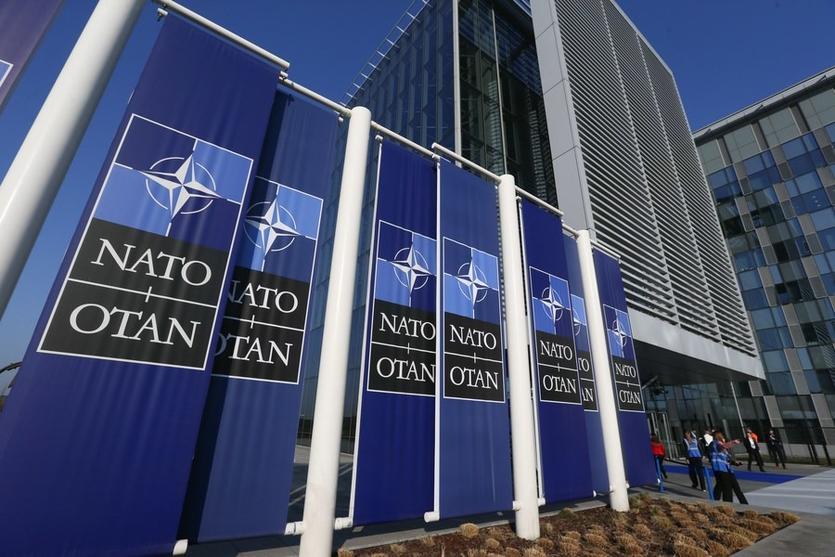China calls for high vigilance as NATO aims to extend reach beyond its scope
 Staff members work at the NATO Headquarters in Brussels, Belgium, March 24, 2022. (PHOTO / XINHUA)
Staff members work at the NATO Headquarters in Brussels, Belgium, March 24, 2022. (PHOTO / XINHUA)
Security arrangements in the Asia-Pacific are being realigned as NATO looks to the region for an Asian version of the trans-Atlantic alliance.
The latest move is a pact signed by Philippine President Ferdinand Marcos Jr and Japan's Prime Minister Fumio Kishida that allows their countries' armed forces to work together on disaster relief. This arrangement is being seen as a step toward a broader pact that could allow the two countries to deploy forces on each other's soil, Reuters reported.
In a joint statement issued on Feb 9, Marcos and Kishida vowed to strengthen the two countries defense and security collaboration through "strategic reciprocal port calls and aircraft visits, transfer of more defense equipment and technology. Continuous cooperation previously transferred defense equipment and capacity building", the Philippine News Agency said.
Marcos, ending a five-day visit to Japan on Sunday, said he saw no reason why the Philippines should not have a Visiting Forces Agreement with Japan if it would boost maritime security.
This so-called like-mindedness would allow Japan to develop security collaboration with countries in the region and beyond, and NATO to pay closer attention to Asia or the so-called "Indo-Pacific".
Japan says it plans to use its official development aid to help poorer countries with their maritime safety and other security capabilities. Its Foreign Minister Yoshimasa Hayashi calls it "indispensable" for Japan not only to fundamentally reinforce its own defense power but also to improve the deterrence capability of "like-minded" countries.
In April, the Foreign Ministry will get 2 billion yen ($15 million) to help strengthen the national security of such countries. The money is primarily for "Indo-Pacific" militaries and separate from the 442 billion yen in development money that the ministry says is not to fund weapons, The Associated Press reported.
NATO's Secretary-General Jens Stoltenberg, visiting South Korea last month, referred to "like-minded democracies", a term covering some countries outside the trans-Atlantic alliance.
In a speech at the CHEY Institute for Advanced Studies in Seoul on Jan 30, Stoltenberg said that what happens in Europe matters to the "Indo-Pacific" region, and what happens in Asia matters to NATO.
In February last year the White House issued the "Indo-Pacific "Report, which said the European Union and NATO are increasingly turning their attention to the region and will harness this opportunity to align approaches and implement initiatives in coordination, thereby increasing their effectiveness.
In a historic first, Australia, Japan, New Zealand and South Korea attended NATO's summit last July. In Seoul, Stoltenberg also publicly announced his intention to invite both South Korean and Japanese leaders to this year's summit in Vilnius, Lithuania.
New normal
By declaring his intention to once again have Australia, Japan, New Zealand and South Korea at NATO's summit, Stoltenberg is signaling that their presence may become part of the alliance's new normal, Sara Bjerg Moller, faculty member of the Security Studies Program at the Edmund A. Walsh School of Foreign Service at Georgetown University in Washington, wrote in a blog for the Atlantic Council.
Carmen Romero, NATO's deputy assistant secretary-general for Public Diplomacy, stressed in her introductory remarks at the event at NATO headquarters in Brussels the importance of building strong partnerships with countries in the "Indo-Pacific", in line with NATO's new Strategic Concept.
Security Dialogue involving Australia, India, Japan and the US has sparked concern among some in the Asia-Pacific.
China's Foreign Ministry spokeswoman Mao Ning said on Feb 1: "While claiming to remain a regional defensive alliance, NATO has constantly sought to reach beyond its traditional defense zone and scope, strengthen military and security ties with Asia-Pacific countries and hyped China threats. Such developments call for high vigilance among regional countries. The Asia-Pacific is not a battlefield for geopolitical contests and does not welcome the Cold War mentality and bloc confrontation."
AUKUS, which is being called a "trilateral security partnership", is essentially about fueling military confrontation through military collaboration, Mao said. China is deeply concerned and firmly opposes the initiative, which creates additional nuclear proliferation risks, exacerbates the arms race in the Asia-Pacific and hurts regional peace and stability, she said.
Wang Sheng, a professor at Jilin University in Changchun, said Stoltenberg's visit to South Korea and Japan is a move to promote an Asian version of NATO.
Last year, Japan and South Korea joined the NATO Cooperative Cyber Defense Centre of Excellence, which is open to countries that are not part of the military alliance. The center now consists of 32 members, 27 of which are full NATO members.
Liu Weidong, a researcher with the Institute of American Studies of the Chinese Academy of Social Sciences in Beijing, said Stoltenberg's visit is the beginning of the substantial progress of NATO's Asia-Pacific version.
In addition to the US, South Korea and Japan, NATO allies of the US such as France, Germany, Poland and the United Kingdom are showing growing concern about security issues in the Asia-Pacific region.
The security environment in the region is already complicated, Liu said. So the intervention of powers from outside the Asia-Pacific will complicate matters and be harmful to the region's security and economic development, Liu said.


